What Islam Exactly Is? Exploring the Core Tenets and Principles
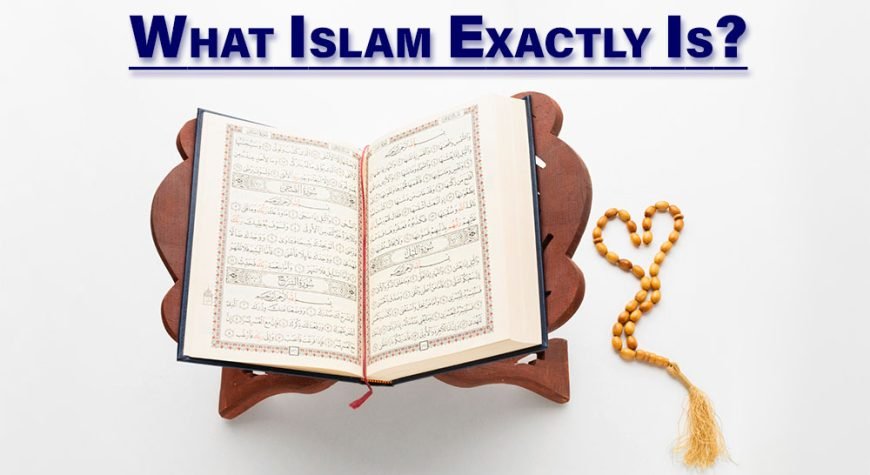
I. Introduction
“Islam, a religion of profound depth and rich diversity. Often misunderstood due to cultural variations and personal interpretations. To truly gr asp its essence, it is essential to delve into its core principles and tenets. So, let’s embark on a journey of understanding and exploring this complete way of life that brings tranquility and contentment to over 2 billion Muslims around the globe.”
II. The Essence of Islam
What Islam Is: Definition and Meaning
At its core, Islam is not only a religion but also a comprehensive way of life that brings tranquility and contentment to its adherents. It aims for peace, unity, and total submission to the will of Allah – The Alone True God. The term “Islam” comes from the Arabic root “S-L-M, س-ل-م” which primarily means “peace” but also connotes “submission” and “surrender.” This definition beautifully sums up the essence of Islam: it calls for a peaceful surrender to the will of the Creator. As the Quran states, “Indeed, the religion in the sight of Allah is Islam” (Quran 3:19).
Understanding the Word ‘Muslim’
A ‘Muslim’ is an adherent of Islam. It’s someone who willingly submits to the will of Allah, embraces His teachings, and strives to live in accordance with them. The term comes from the same root as Islam, emphasizing the act of voluntary submission to God’s commandments. Muslims around the globe strive to live lives of peace, harmony, and submission, guided by the Holy Quran and the life of the Prophet Muhammad (ﷺ). In the words of the Quran, “And who is better in religion than one who submits himself to Allah while being a doer of good…“ (Quran 4:125).
The Concept of Allah: The One (Alone) True God
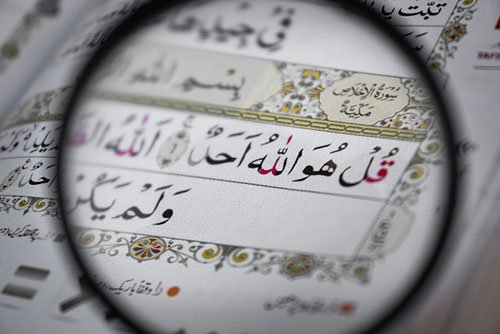
Allah – The Alone True God
In Islam, ‘Allah’ refers to the One (Alone) True God – an absolute entity beyond comparison, distinct from His creations yet intimately close to individuals. He is the Creator, Sustainer, and Planner of all that exists, possessing perfect attributes and free from all defects. The Quran beautifully encapsulates this concept in the verses, “Say, He is Allah, [who is] One, Allah, the Eternal Refuge. He neither begets nor is born, Nor is there to Him any equivalent“ (Quran 112:1-4). For Muslims, Allah is the focal point of their faith, and they aim their actions at earning His pleasure and mercy.
Unity and Diversity in Islam
A distinctive feature of Islam is the unity and diversity that it fosters among its followers. Islam is practiced by over 2 billion people worldwide, from different races, ethnicities, cultures, and nationalities. However, they are all united under the banner of Islam, praying to the same God, following the same scripture, and observing the same religious practices. This unity in diversity is beautifully depicted during the annual pilgrimage of Hajj, where millions of Muslims, irrespective of their worldly status, gather in Mecca dressed in simple white garments, standing as equals before Allah.
The Quest for Knowledge in Islam
Islam places a significant emphasis on the acquisition of knowledge, promoting intellectual growth alongside spiritual development. It encourages its followers to observe, reflect, and seek knowledge about the world around them to understand and to appreciating the signs of Allah. The very first verse revealed to Prophet Muhammad (ﷺ) underscores this focus on learning, “Read in the name of your Lord who created” (Quran 96:1).
This brief exploration into the essence of Islam underscores the depth and breadth of this faith. Far from being merely a set of rituals, it is a comprehensive way of life that guides every aspect of human life, from personal ethics to social conduct, from economic transactions to political governance, all under the umbrella of submission to The One (Alone) True God – Allah.
III. The Holy Quran: The Guiding Scripture of Islam
What is the Quran: The Word of Allah
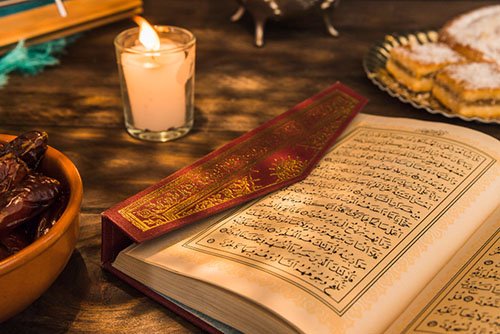
The Holy Quran – The Word of Allah
The Quran, often described as the living miracle of Islam, is considered the verbatim word of Allah. It serves as the primary source of Islamic teachings, principles, and guidance for Muslims worldwide. Revealed over a span of 23 years to Prophet Muhammad (ﷺ), it remains unaltered since its revelation, a testament to its divine origin. As the Quran itself states, “This is the Book about which there is no doubt, a guidance for those conscious of Allah” (Quran 2:2).
The Preservation and Authenticity of the Quran
The Quran’s preservation is a divine guarantee from Allah. Despite being revealed over 14 centuries ago, it remains unchanged in its text and its recitation. This unmatched preservation, in both oral and written form, is a unique feature that reinforces the Quran’s authenticity. As Allah says in the Quran, “Indeed, it is We who sent down the message [Qur’ān], and indeed, We will be its guardian.” (Quran 15:9).
Key Teachings and Themes in the Quran
The Quran, with its 114 chapters (Surahs), covers a myriad of teachings and themes, including monotheism (Tawhid), prophethood (Nubuwwah), life after death (Akhirah), moral values, guidance for personal development, and laws for societal harmony. It addresses all aspects of life, outlining the path to a peaceful existence in this world and eternal success in the Hereafter. The Quran also contains many accounts of previous prophets and their communities, serving as lessons for humanity.
The Quran: A Book of Signs and Wisdom
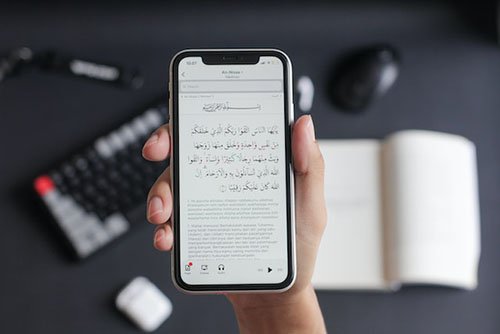
The Quran – A Book of Signs and Wisdom
While the Quran is not a book of science, it contains verses (Ayahs) that hint at various natural phenomena, encouraging its readers to reflect on the wonders of the universe. These signs, referred to as Ayat in the Quran, are meant to inspire contemplation about the Creator’s majesty and wisdom. As Allah states, “Indeed, in the creation of the heavens and the earth and the alternation of the night and the day are signs for those of understanding” (Quran 3:190).
The Impact of the Quran on Individual and Societal Life
The Quran provides comprehensive guidelines for individual behavior and societal dynamics. Its teachings encourage personal development, instill a sense of social responsibility, and inspire the pursuit of justice, compassion, and mutual respect. It serves as a moral compass, guiding Muslims towards a balanced and purposeful life. The Quran has had a profound influence on diverse aspects of society, from laws and governance to arts and culture.
The Quran is more than just a book; it is a timeless guide for life, filled with wisdom, guidance, and solace for all of humanity. Regardless of religious affiliation, anyone can find profound insights within its pages. By turning to the Quran, Muslims and even those who do not identify as Muslims find direction in their quest for a meaningful and fulfilling life, thus shaping their individual lives and contributing positively to their societies.
IV. Core Tenets: The Five Pillars of Islam
Introduction to the Five Pillars of Islam
The Five Pillars of Islam are the fundamental principles that guide a Muslim’s faith and practices. They serve as the foundation of a Muslim’s life, encompassing the essential aspects of faith and worship. They are: Shahada (faith in Allah), Salah (prayer), Zakat (almsgiving), Sawm (fasting), and Hajj (pilgrimage).
Shahada: Declaration of Faith
The Shahada is the declaration of faith, stating, “There is no god but Allah, and Muhammad (ﷺ) is the Messenger of Allah“. It is the basic tenet of Islam, affirming monotheism and the prophethood of Muhammad (ﷺ). This declaration is a Muslim’s pledge to worship Allah alone and follow the teachings of His final prophet, Muhammad (ﷺ).
Salah: The Five Daily Prayers
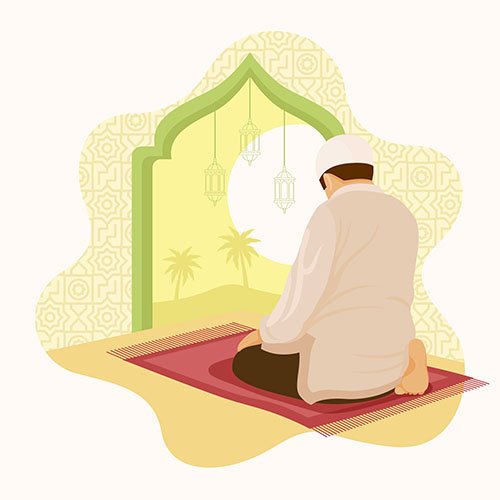
Salah – The Five Daily Prayers
Salah, the ritual prayer, is performed five times a day by Muslims to make or maintain a direct link with Allah. These prayers, performed at dawn, noon, afternoon, sunset, and night, serve as a constant reminder of Allah’s presence and guidance. The Quran states, “Establish prayer. Indeed, prayer prohibits immorality and wrongdoing” (Quran 29:45).
Zakat: Obligatory Charity
Zakat, or obligatory charity, is a means by which Muslims purify their wealth by sharing a portion with those in need. It cultivates a sense of empathy and social responsibility among Muslims while contributing to social equality. Allah says in the Quran, “And establish prayer and give Zakat, and whatever good you put forward for yourselves – you will find it with Allah” (Quran 2:110).
Sawm: Fasting in the Month of Ramadan

Sawm – Fasting in the Month of Ramadan
Sawm refers to the annual fast observed by Muslims during the holy month of Ramadan, from dawn till sunset. This period of fasting is a time of spiritual growth, self-discipline, and increased devotion. The Quran mentions, “O you who believe, fasting is prescribed upon you as it was prescribed upon those who were before you, so that you may become righteous.” (Quran 2:183).
Hajj: Pilgrimage to Mecca
The Hajj is the annual pilgrimage to the holy city of Mecca, which every able-bodied and financially capable Muslim is required to undertake at least once in their lifetime. The Hajj symbolizes unity, equality, and submission to Allah. The Quran states, “And [due] to Allah from the people is a pilgrimage to the House – for whoever is able to find thereto a way” (Quran 3:97).
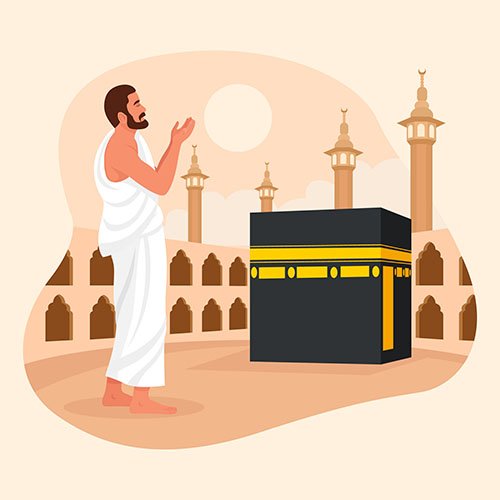
Hajj – Pilgrimage to Mecca
In essence, the Five Pillars of Islam are the basic acts of worship that underpin a Muslim’s life. They serve as the practical manifestation of their faith, encouraging moral development, communal solidarity, and a profound connection with Allah. Each pillar, with its unique significance, completes the holistic spiritual journey of a Muslim, guiding them towards a life of faith, purpose, and fulfillment.
V. Islam’s Impact on Individual and Community Life
Personal Life: Morality, Ethics, and Character
Islam has a profound impact on the personal life of its adherents. It provides comprehensive guidance on matters related to morality, ethics, and character. It encourages self-discipline, honesty, kindness, forgiveness, and many other noble qualities. The Prophet Muhammad (ﷺ) is reported to have said, “The best among you are those who have the best manners and character“ (Bukhari: 3559). By adopting these values, Muslims strive to improve their character and live a fulfilling life.

Personal Life: Morality, Ethics, and Character
Family Life: Bonds, Responsibilities, and Harmony
In the context of family, Islam lays down clear guidelines for the rights and responsibilities of every member. It emphasizes respect, love, and cooperation among family members, leading to a harmonious family life. The Quran beautifully explains this by stating, “And among His Signs is this, that He created for you mates from among yourselves, that ye may dwell in tranquillity with them, and He has put love and mercy between your (hearts): verily in that are Signs for those who reflect.” (Quran 30:21).

Societal Impact: Unity, Justice, and Cooperation
When it comes to society, Islam promotes unity, justice, and cooperation among its members. It encourages the establishment of a just society where everyone’s rights are protected, and their needs are met. It fosters a sense of brotherhood, empathy, and mutual support. The Quran says, “O mankind, indeed We have created you from male and female and made you peoples and tribes that you may know one another” (Quran 49:13).
Economic Impact: Fairness, Generosity, and Prohibition of Usury
Islam also has a significant impact on the economic aspects of life. It promotes a fair and just economic system, emphasizing generosity, honesty in transactions, and prohibition of usury. The Quran warns, “Those who consume interest cannot stand [on the Day of Resurrection] except as one stands who is being beaten by Satan into insanity. That is because they say, “Trade is [just] like interest.” But Allāh has permitted trade and has forbidden interest.” (Quran 2:275).
Political Impact: Leadership, Consultation, and Rule of Law
Islam’s influence extends to the political sphere as well. It promotes principles such as leadership based on merit, consultation in decision-making, and adherence to the rule of law. The Quran instructs, “and whose business is [conducted] through mutual consultation among themselves,” (Quran 42:38).

Political Impact: Leadership, Consultation, and Rule of Law
In conclusion, Islam’s impact on both individual and community life is profound and wide-ranging. It provides guidance for every aspect of life, aiming to foster individuals of good character and societies characterized by justice, peace, and prosperity.
VI. Reflecting on the Path of Islam
Islam, as we have explored, is not merely a religion but a comprehensive way of life. It touches every aspect of human existence, aiming to cultivate individuals of good character and societies imbued with justice, unity, and peace.
Islam’s core tenets, enshrined in the Five Pillars, are designed to nurture spiritual growth, social responsibility, and a deep connection with Allah. The Quran, as the divine word of Allah, offers guidance, inspiration, and solace. It serves as a beacon of light for the believer, illuminating the path towards a meaningful and fulfilling life.
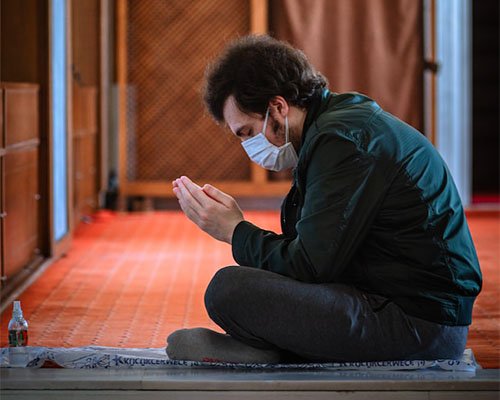
Reflecting on the Path of Islam
Islam encourages reflection and contemplation, both on the Quranic verses and on the marvels of the universe. As Allah states, “Then do they not reflect upon the Qur’ān, or are there locks upon [their] hearts?” (Quran 47:24). Through such reflection, we gain insights into our purpose in life, our role in society, and our relationship with the Creator.
The journey on the path of Islam is an ongoing one, involving constant learning, growth, and striving for moral and spiritual excellence. As Muslims, we are called upon to be ambassadors of our faith, embodying the teachings of Islam in our actions and interactions. In striving to become a Momin – the ideal believer as per Islamic teachings – this journey becomes even more profound and transformative. The goal is not just to identify as a Muslim, but to grow and evolve into a Momin, embodying the highest principles of the faith in every aspect of our lives.
As we conclude this exploration of Islam, we hope it has shed light on the essence, principles, and impact of this beautiful way of life. May this knowledge inspire us to continue learning, reflecting, and striving on the path of Islam, aiming to become the best version of ourselves and contribute positively to our communities.
References
- The Holy Quran
- Sahih Bukhari
- Sahih Muslim
- “Understanding Islam and the Muslims” by The Islamic Affairs Department, The Embassy of Saudi Arabia, Washington, D.C.
- “Introduction to Islam” by Dr. Muhammad Hamidullah
- “Bayan-ul-Quran” (Explanation of the Quran) by Dr. Israr Ahmad
- “The Qur’an & Modern Science: Compatible or Incompatible?” by Dr. Zakir Naik
This article is aimed at providing an overview of Islam and its principles. For a more detailed understanding, readers are encouraged to engage with the primary sources, particularly the Quran, and reputable Islamic literature. May this serve as a starting point on your journey towards understanding Islam.
Frequently Asked Questions
- What are the Five Pillars of Islam?
The Five Pillars of Islam are the fundamental principles that guide a Muslim’s faith and practices. They include Shahada (faith), Salah (prayer), Zakat (almsgiving), Sawm (fasting), and Hajj (pilgrimage). - What is the role of the Quran in Islam?
The Quran serves as the divine word of Allah and the guiding scripture of Islam. It offers guidance, inspiration, and solace to its followers. - What does Islam teach about personal and community life?
Islam provides comprehensive guidance on matters related to morality, ethics, character, family bonds, responsibilities, unity, justice, and cooperation among society members. - What is the difference between Islam and other religions?
While all religions have their unique beliefs and practices, Islam’s core essence lies in its complete way of life that encompasses not only religious rituals but also personal, familial, societal, economic, and political aspects. - What is the primary purpose of Islam?
The primary purpose of Islam is to guide individuals towards a meaningful and fulfilling life, grounded in morality and ethics, and to establish societies characterized by justice, peace, and prosperity.
Lorem Ipsum


3 comments
Tawhid: Unveiling Divine Oneness of Allah (Complete Insight)
January 26, 2024 AT 6:03 pm[…] This comparative study explores the similarities and differences in the understanding of God in Islam and other major faiths, providing insights into how monotheism is interpreted and practiced […]
Creation of the Universe in Quran: (We are [its] expander)
January 31, 2024 AT 6:25 am[…] verse not only highlights the power and capability of Allah but also sets a foundational belief in Islam about the origins of the […]
What is Holy Quran: A Complete Guide for Everyone (2023)
February 1, 2024 AT 5:36 am[…] Quran, often referred to as the Holy Quran, is the divine scripture central to the religion of Islam. Muslims believe it to be the verbatim word of Allah (God) as revealed to the Prophet Muhammad […]